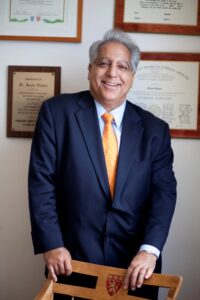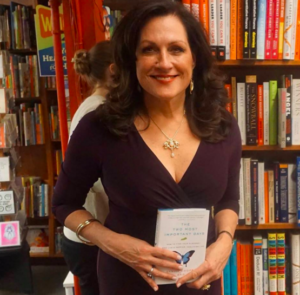By Matt Robinson, Contributing Writer

CAMBRIDGE – In their book “The Two Most Important Days: How to Find Your Purpose and Live a Happier, Healthier Life,” Dr. Sanjiv Chopra and Gina Vild provide wisdom and practical tools that can lead to greater daily joy and abundance.
How does one approach a life that gives joy? What simple steps can each of us take to achieve lasting happiness? It’s important to know that happiness is hard-wired in our DNA. Most of us yearn for it but sadly search in the wrong places.
Mark Twain’s suggestion
They based their thesis (and their title) on the suggestion by Mark Twain that, “the two most important days in your life are the day you are born and they day you find out why.” Vild and Chopra not only suggest why it is important to find your purpose in life but offer practical, research-based advice as to how to go about doing so.
Chopra and Vild met at Harvard Medical School, where she was serving as an associate dean and the school’s chief communication officer, and he as a professor of medicine and the faculty dean of continuing education. In addition to being colleagues, they found a common passion, the quest for happiness and life purpose.
A shared sensibility
“We shared a sensibility about many things,” Vild observed. “We often shared motivational quotations that prod positive behavior and had deep-dive discussions about life’s big questions.”

As they worked on their own book, Chopra and Vild also discovered they shared an interest in literature, including a common love for the Sufi poet Rumi and the psychologist Viktor Frankl, who wrote the iconic book “Man’s Search for Meaning” about his how it was possible to find happiness and joy in the aftermath of the Holocaust.
“We often talked about happiness and why some folks appeared more prone to being happy despite experiencing life’s turbulent waters,” Chopra explained.
As they began formulating their book, they learned more than 200,000 books had already been written on the topic of happiness. They chose a fresh approach by differentiating their book on the role of purpose as a pathway to happiness.
“We saw there was a gap in the literature, and that we could offer fresh and valuable advice on how one could be happier,” Vild suggested. “There were certainly a variety of books that identified the problem, but few that offered that magic sauce of both practical and inspirational advice on how one could boost their happiness quotient.”
“The Two Most Important Days” offers personal stories, practical science-based findings, philosophical wisdom, and poetry. It includes exercises and a form of workbook to guide the reader in a simple and meaningful way.
“The psychological, physical, and social benefits of being happy are well documented,” Chopra assured, citing his research and that of many of his esteemed colleagues. “Those who identify as being happy enjoy more satisfying relationships, have better cardiac health, sleep better, and research is even showing happiness may lead to greater longevity.”
Chopra and Vild distill their findings to what they call the four tenets of happiness: friends, forgiveness, serving others, and living with gratitude.
Practical advice
When asked for practical suggestions, they advise their readers to nurture a broad range of friendships, find reasons to celebrate life events big and small, release bitterness and anger, and, importantly, live with gratitude each and every day. One more powerful bit of advice: smile broadly and often.
On this front, the book presents research that shows children smile an average of 400 times a day, while adults typically smile about 20 times a day. As a result, adults have less dopamine in their system and so are less happy overall. Beyond this, smiling is infectious, and has an exponential effect of making others smile infusing the world with greater joy.
Vild and Chopra will discuss their research and writings at the Needham Free Public Library on Tuesday, March 27 at 7:30 p.m. To register, please visit https://needhamlibrary.org/events/.
RELATED CONTENT:
Happiness as a state of mind (fiftyplusadvocate.com)
Finding purpose when the workday is done – Fifty Plus Advocate
Humor offers benefits to feeling better and improving outlook (fiftyplusadvocate.com)












